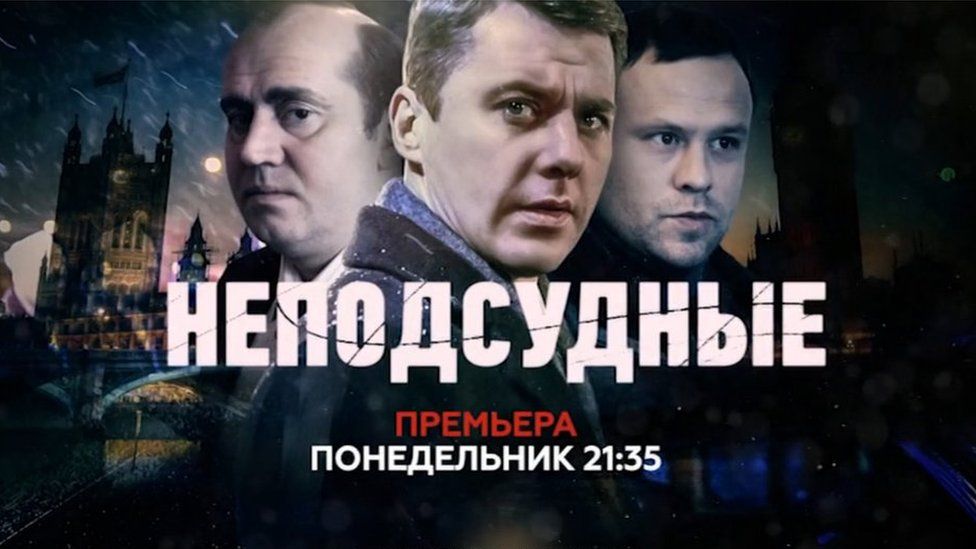Litvinenko death: Russian TV rewrites London polonium murder
- Published

The scene is an office in London. A man is given a poisoned glass of wine by an exiled Russian oligarch. When he gets out into the street, he quickly becomes unwell and vomits in the gutter. Later he meets a fellow former KGB officer in an hotel restaurant.
The sick man orders tea, while his contact is clearly shown sitting at some distance from the teapot, which he does not touch.
This is the version of the poisoning of Alexander Litvinenko as told in an eight-part political thriller called Nepodsudnye (The Untouchables) shown recently on Russia's NTV.
'Jackal-traitor'
Mr Litvinenko, a former FSB agent who became a Kremlin critic, was poisoned by radioactive polonium in London in 2006. The report of the long-awaited inquiry into his death is due to be sent to UK Home Secretary Theresa May by the end of the year.
The main hero of Nepodsudnye is Andrei Voronov - in the words of critic Ksenia Larina, a "noble knight, a real Lancelot". Playing foil to him is Alexander Volkov - again in Ms Larina's words, a "jackal-traitor".
The surnames have been changed, but Volkov is clearly meant to be Mr Litvinenko, while Voronov equally clearly is Andrei Lugovoi, the man wanted in the UK over Mr Litvinenko's murder.
It is no surprise that Nepodsudnye paints such a flattering picture of Mr Lugovoi. Now a well-known MP with his own TV show, he was the serial's consultant.
The oligarch shown poisoning Volkov is Boris Berezovsky, who was once a power broker at the Kremlin but went into self-imposed exile in the UK. In the years before his death in 2013 he was Russian TV's ultimate bogeyman and a friend of Alexander Litvinenko.
Mr Berezovsky was found with a ligature around his neck and an open verdict was recorded into his death.
In Nepodsudnye, he is played partly for laughs by a famous impressionist. But there are also flashes of evil genius.
"If we get control of television, the country is ours," he says at one point.
As critic Irina Petrovskaya wrote in Novaya Gazeta, this is actually a pretty accurate description of President Vladimir Putin's own strategy. But Mr Putin is not mentioned in Nepodsudnye. He only appears as a portrait on office walls.
More on the Litvinenko story
Alexander Litvinenko - murdered Russian agent
A deadly trail of polonium - the inside story
Berezovsky - the Kremlin powerbroker who became a dissident
Lurking behind Mr Berezovsky is British Intelligence in the guise of a gimlet-eyed spymaster with perfect Russian, Martin Stevenson.
Near the end, Mr Berezovsky reports to Stevenson on the work he has done for the British, producing a folder with photographs of what appear to be the results of terror attacks.
Commenting ahead of screening, liberal journalist Andrei Arkhangelsky said the Nepodsudnye project had all the hallmarks of a "secret service operation" meant to impress on viewers a "convincing" account of the Litvinenko murder.
But its account is anything but convincing.
For instance, it does not even mention polonium, the radioactive substance that Litvinenko appears to have ingested when he drank tea with Mr Lugovoi and another ex-KGB man Dmitry Kovtun.
'Parody'
Nepodsudnye is not the only piece of Litvinenko revisionism currently doing the rounds.
In September, the Russian embassy in London hosted a screening of a documentary-style film by director Alexander Korobko, which also seeks to put Mr Lugovoi in the clear.
Despite a strong cast and primetime slot, Nepodsudnye was not a big hit with viewers and was slated by critics.
Even the critic of pro-Kremlin tabloid Komsomolskaya Pravda was not impressed, calling it a "parody". "It is impossible to watch it without a smile," he said.
BBC Monitoring reports and analyses news from TV, radio, web and print media around the world. You can follow BBC Monitoring on Twitter and Facebook.
- Published21 January 2016
- Published31 July 2015
- Published31 July 2015